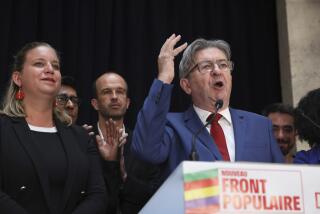Ruling party in Turkey wins big
- Share via
ISTANBUL, TURKEY — Voters Sunday handed Turkey’s Islamist-influenced ruling party a decisive victory in parliamentary elections, rewarding it for stewardship of the country’s robust economy but raising the specter of bitter new quarrels over the feared erosion of Turkey’s secular traditions.
With 99% of the votes counted, the Justice and Development Party, known by its Turkish initials AKP, garnered about 47% of the vote, according to unofficial results -- a substantial increase over the 34% it received in elections five years ago when it came to power.
The vote could have far-reaching consequences for Turkey’s engagement with the West, including its drive to become the first Muslim-dominated country to join the European Union. Though secularist parties have been cool to that idea, the AKP has vowed to press ahead with the bid despite early rebuffs.
“With this vote, Turkey said no to insularity, no to closing in on itself,” said Cengiz Candar, a prominent political columnist.
The moderate and officially secular country, which is a member of the North Atlantic Treaty Organization, is viewed as a strategic bridge to a Muslim world increasingly mistrustful of the West, particularly the United States. Successive Turkish governments have maintained close ties with Muslim neighbors even while pursuing divergent policies, such as a cordial relationship with Israel.
The election results were a crushing defeat for Turkey’s secular-minded main opposition party, which got about 20% of the vote. Still, because of rules governing the allocation of parliamentary seats, the opposition will have some ability to stymie AKP initiatives, including the party’s drive to have one of its own elected president -- the same battle that triggered these early elections.
The AKP’s resounding victory could fuel tensions with Turkey’s powerful military, which considers itself the guardian of the secular system put in place 84 years ago by the country’s founder, Kemal Ataturk.
The army, which has dislodged four Turkish governments in the last half-century, has made none-too-subtle threats to intervene if it believes the ruling party is acting in conflict with the secular principles enshrined in the constitution.
Perhaps mindful of those tensions, Prime Minister Recep Tayyip Erdogan struck a reconciliatory tone in his victory speech, paying homage to Ataturk and offering assurances that his party’s agenda was firmly centered on the pro-business, free-market policies that have generated unprecedented economic prosperity since it took power.
“We would like to see Turkey as one, as united,” the 53-year-old leader said as supporters cheered and waved the national flag. “Our goal is to realize the aim of Ataturk, to carry our country to the levels of modern civilization.”
Revelers took to the streets near AKP headquarters in Istanbul and the capital, Ankara, setting off fireworks and handing out sweets.
During the party’s tenure, rampant inflation has been tamed, annual growth has run to 7%, unemployment has leveled off and the national currency has strengthened. The boom has brought a middle-class lifestyle within reach of millions of Turks, including many in the party’s religiously conservative core constituency.
“It’s a fact that there are more cars on the roads, more consumption, more buying in the supermarkets -- the lively economy has given confidence to the people,” said Ertugrul Ozkok, editor in chief of the mainstream newspaper Hurriyet. “That was reflected in this vote.”
To some observers, the elections marked another milestone in the development of Turkey’s own brand of political Islam, a democratic model unlike others in the Muslim world. The AKP is an offshoot of a more rigorously Islamist party, but Erdogan and other senior party figures have made little effort to bring their personal piety into the public sphere.
But that reticence has done little to quell secularists’ wariness. Many are convinced the AKP harbors a hidden Islamist agenda, one that is more likely now to make inroads into public policy, perhaps in the form of relaxed restrictions on Islamic dress at public universities and among civil servants.
“We see the danger of Sharia [Islamic law] and fundamentalism,” said Hatice Ozbay, a volunteer for the Republican People’s Party, or CHP, the main secular group. “We will keep on fighting that.”
The AKP alarmed secularists early in its tenure with a movement to criminalize adultery and ease restrictions on wearing head scarves. It has said it has no plans to revive such legislation, but secularists fear the overwhelming election mandate will leave the party feeling obliged to make some gesture to its devout Muslim constituents.
The AKP worked hard to broaden its appeal, revamping its party list to remove religious hard-liners and fielding several liberal secular candidates.
“People embraced democracy,” said Zeynep Dagi, a female academic who won election on the AKP ticket. “And they looked at the AKP’s performance.”
Of the 14 parties that took part, only three reached the vote threshold of 10% required to enter parliament: the AKP, the CHP and the far-right National Movement Party.
Rising nationalism has been an unsettling force in recent years, with many Turks blaming the phenomenon for the assassination this year of Hrant Dink, editor of a prominent Armenian-language newspaper.
Nationalist sentiment also underpinned the virulent anti-American and anti-European rhetoric that was voiced at many of the big rallies organized in April and May by the secular camp.
Turkey’s EU membership bid has not been enthusiastically received in Europe, in part because of concerns about the country’s human rights record and its curbs on freedom of expression. Many Turks believe their country is being discriminated against for being overwhelmingly Muslim, and they have become disillusioned with the government’s efforts to join a club they believe will never accept them anyway.
But the growing domestic unpopularity of the EU bid did not appear to dent the appeal of the AKP, in part because the party has managed to frame the membership drive as a pragmatic step that fits well with its other economic policies.
In another milestone, about 20 Kurdish candidates -- who ran as independents to avoid having to reach the vote threshold for parties -- won parliamentary seats. Their accession, the first by Kurds in more than 15 years, comes as the government is weighing an incursion into northern Iraq to fight Kurdish rebels.
The United States and other Western countries that are allies of the semiautonomous Kurdish region of Iraq strongly oppose such a move. But Erdogan will probably come under heavy domestic pressure to rein in the separatist Kurdistan Workers Party, or PKK, which uses northern Iraq as a springboard for attacks. Scores of Turkish soldiers have been killed this year in clashes with the rebels.
“Our struggle against terrorism will continue,” the prime minister said in his victory speech. “Our safety will be protected.”
As its leaders had hoped, the AKP’s margin of victory means it will be able to govern alone, without entering into a parliamentary coalition.
But even with its solid majority, it fell short of the 367 parliamentary votes needed to elect a president or change the constitution.
Lawmakers are to choose a new president within 30 days. With the opposition still stung by defeat, that could result in the same deadlock that occurred in April, when the AKP put forth Foreign Minister Abdullah Gul as its candidate.
Gul’s wife wears a head scarf, and secularists were appalled by the notion of a first lady in Islamic dress.
Some of the largest protests in the country’s modern history were held across Turkey to decry Gul’s candidacy.
After strong hints of intervention by the army, and an unfavorable ruling by the secularist-dominated Constitutional Court, the AKP abandoned the bid to elect Gul and called early national balloting.
But the party says it is determined to claim the presidency, a post that many secularists regard as their birthright, with a bloodline leading back to Ataturk.
High voter turnout -- about 80% -- reflected the passions engendered by the campaign.
Many people in this nation of 74 million cut short their summer vacations to return home to vote, lining up at polling places in the sultry heat and emerging with forefingers stained with the indelible purple ink that is used to prevent fraud.
“I hope we will have our reward today,” said Fatma Dogangul, who arrived at a polling station in central Istanbul dressed in a full-length chador and a veil that left only her eyes visible. “And also our reward in the world to come.”
More to Read
Sign up for Essential California
The most important California stories and recommendations in your inbox every morning.
You may occasionally receive promotional content from the Los Angeles Times.













